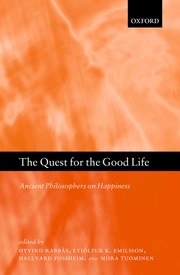Miira Tuominen, ’Why Do We Need Other People to Be Happy? Happiness and Concern for Others in Aspasius and Porphyry’ in Øyvind Rabbås, Eyjólfur K. Emilsson, Hallvard Fossheim and Miira Tuominen (eds.), The Quest for the Good Life: Ancient Philosophers on Happiness. Oxford University Press 2015
 In her contribution to the collection, Quest for the Good Life: Ancient Philosophers on Happiness, Miira Tuominen explores rather understudied aspects of late ancient philosophy. First, she argues that in his commentary on the Nicomachean Ethics, Aspasius (early 2nd century CE) brings in other people to his brief explanation of the good life. While Aristotle stresses that only a complete life can be assessed in terms of happiness, Aspasius points out that it is only within a complete life that one can do good things to others as well as much as possible. This implies that good things done to others have a role in Aspasius’ analysis of the good life in a new way. However, an even more important role is given to concern for other living creatures in Porphyry’s sustained argument addressed to his friend Firmus Castricius. The main point of the argument is that justice requires one to abstain from injuring living creatures, animals and ultimately even plants that are such that they do not harm us. Tuominen suggests that Porphyry’s treatise manifests a rather exceptional, novel approach to ethics within ancient ethics.
In her contribution to the collection, Quest for the Good Life: Ancient Philosophers on Happiness, Miira Tuominen explores rather understudied aspects of late ancient philosophy. First, she argues that in his commentary on the Nicomachean Ethics, Aspasius (early 2nd century CE) brings in other people to his brief explanation of the good life. While Aristotle stresses that only a complete life can be assessed in terms of happiness, Aspasius points out that it is only within a complete life that one can do good things to others as well as much as possible. This implies that good things done to others have a role in Aspasius’ analysis of the good life in a new way. However, an even more important role is given to concern for other living creatures in Porphyry’s sustained argument addressed to his friend Firmus Castricius. The main point of the argument is that justice requires one to abstain from injuring living creatures, animals and ultimately even plants that are such that they do not harm us. Tuominen suggests that Porphyry’s treatise manifests a rather exceptional, novel approach to ethics within ancient ethics.
